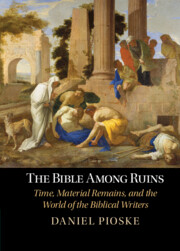Book contents
- The Bible Among Ruins
- The Bible Among Ruins
- Copyright page
- Dedication
- Contents
- Figures
- Preface
- Acknowledgments
- Introduction
- One On Ruins, Then and Now
- Two Shiloh and the Ruins of Memory
- Three The Ruins of Rachel’s Tomb and the Presence of the Past
- Four Jerusalem and the Ruins of Tomorrow
- Conclusion
- Bibliography
- Subject Index
- Scripture Index
Conclusion
Published online by Cambridge University Press: 11 October 2023
- The Bible Among Ruins
- The Bible Among Ruins
- Copyright page
- Dedication
- Contents
- Figures
- Preface
- Acknowledgments
- Introduction
- One On Ruins, Then and Now
- Two Shiloh and the Ruins of Memory
- Three The Ruins of Rachel’s Tomb and the Presence of the Past
- Four Jerusalem and the Ruins of Tomorrow
- Conclusion
- Bibliography
- Subject Index
- Scripture Index
Summary
The conclusion to this book returns to the question as to why those in antiquity did not dig more extensively to learn about those who lived before and why we do. It argues that ruins are now about differences that appear in history, and to excavate is to better understand all that separates one era from the next, and us from those who came before. But for the biblical writers ruins were objects that overcame temporal distance and offered continuity in lived experienced. The temporalities of remembrance, presence, and anticipation are all centered on this abiding sense that past experiences preserved in material form bore directly on current ones.
- Type
- Chapter
- Information
- The Bible Among RuinsTime, Material Remains, and the World of the Biblical Writers, pp. 253 - 268Publisher: Cambridge University PressPrint publication year: 2023

